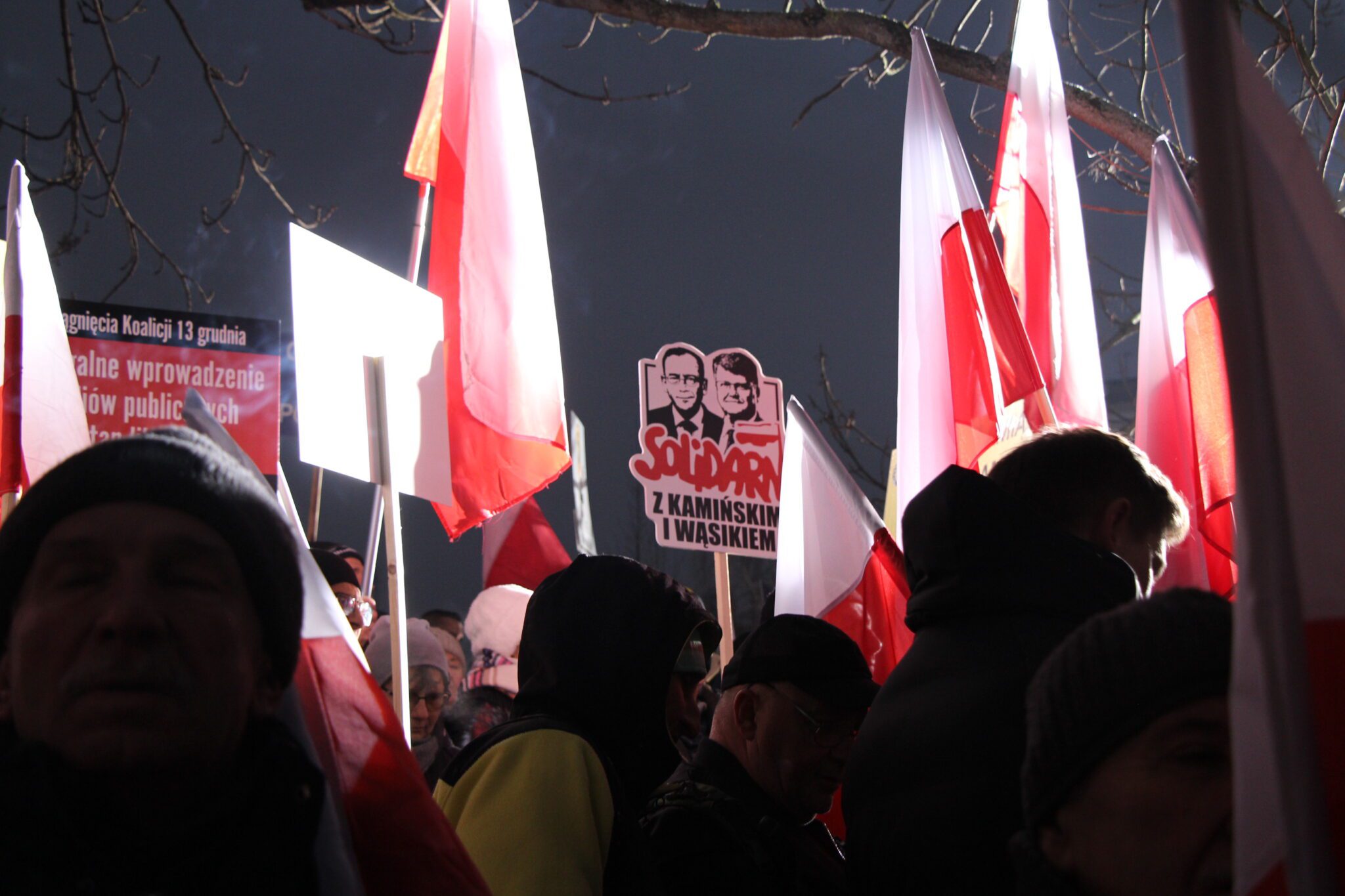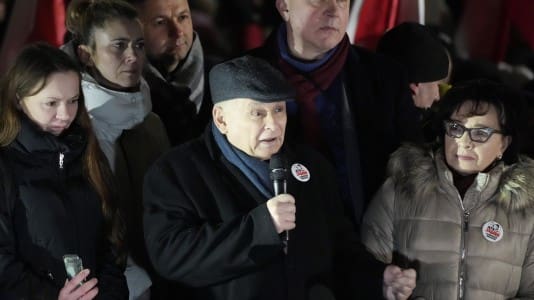This article is republished courtesy of Sovereinty.pl
What exactly did Polish Prime Minister Donald Tusk have two former PiS ministers arrested for? Even after their release following President Duda’s second pardon, the case of former Interior Minister Mariusz Kamiński and former Deputy Minister Maciej Wąsik is continuing to fuel a political debate in Poland.
Both are now opposition MPs and Kamiński is also the vice-president of Law and Justice (PiS), now the largest opposition party after having ruled Poland from 2015 to 2023. After they were detained by the police, who were acting under the orders of Donald Tusk’s interior minister, in the presidential palace on Jan. 9, it was claimed by PiS and a segment of Polish society that both men are Tusk’s first political prisoners. They immediately began a hunger strike that lasted for two weeks. The force-feeding of Mariusz Kamiński, who was tied to his bed while a gastric tube was inserted through his nose – after it was already known that he would be freed the following day, and despite the fact that he had stated that he would not resist intravenous feeding – has been described by opposition leaders and by Kamiński himself to have been a deliberate act of torture.
After the two men were pardoned by President Andrzej Duda for a second time in the same case, given that the ruling left-liberal coalition had questioned the validity of the first presidential pardon that had been granted in 2015, they were released on Jan. 23.
On the wPolityce.pl website, Stanislaw Żaryn recalled the history of the case against the two men, a case that began when they were at the head of Poland’s Central Anti-Corruption Bureau (CBA). Stanislaw Żaryn is a political scientist who used to work as a journalist and columnist. He was also Mariusz Kamiński’s spokesman from 2016 to 2022 in his role as minister in charge of coordinating the special services, a function that was assigned to the interior minister in the PiS governments.
[pp id=104239]
On Tuesday, Jan. 9, Mariusz Kamiński and Maciej Wąsik were detained by police officers and taken to a detention center in Warsaw’s Grochów district. They were soon sent to two different prisons outside Warsaw. Over the course of two weeks, small crowds of people protested their imprisonment every day in front of both prisons despite the unfavorable weather conditions. The case has sparked an enormous controversy and led to serious questions about the legitimacy of the actions that were undertaken by the prosecutors, the courts, and the police.
The Law and Justice party’s position is that declaring that Kamiński and Wąsik’s mandates had ended, as Sejm Speaker Szymon Hołownia did, is illegal, and so was their arrest by the police, who ignored their parliamentary immunity. The coalition government has replied that there has been a final verdict in the two politicians’ case, which in Polish law automatically leads to an MP losing his seat and having to be replaced. In this instance, however, given that the Supreme Court had invalidated Hołownia’s decision to declare the two men’s mandates as terminated, the chief of the National Electoral Commission is asking Hołownia for the legal basis of his decision before he can appoint their successors from the PiS electoral lists to their seats. Amusingly enough, Hołownia and his coalition partners, including Prime Minister Donald Tusk, chose to ignore the Supreme Court’s decision concerning Kamiński and Wąsik’s mandates, saying that the Supreme Court Chamber which ruled on this issue and which had been created as a result of the 2017 judiciary reforms is unlawful.
It is the same chamber which had confirmed the validity of the Oct. 15 election results, and the ruling coalition had no problem with this. Thus, it appears that the parties which for eight years had complained so loudly about alleged breaches of the rule of law under Law and Justice will now only comply with those court rulings that suit them.
But what about the merits of this case? In his article, Stanisław Żaryn recalled the history of the case of the farmland scandal and the subsequent charges against Kamiński and Wąsik.
The farmland scandal
This case dates back to 2006. This is when the Central Anti-Corruption Bureau was established under the first coalition government that was led by PiS (2005–2007). This newly-created bureau, which relied heavily on young officers who had no ties to the former communist security services, had a difficult task ahead. The problem of corruption was widespread in Poland at that time, as in most post-communist countries.
[pp id=106054]
As early as December 2006, CBA officers began hearing rumors about the activities of a certain Andrzej K., who was a board member of the Telefonia Dialog telephone company. Andrzej K. was said to have offered to change the status of any plot of land that was classified as agricultural in Poland, for an appropriate bribe. The man cited acquaintances in Samoobrona, an agrarian party that was then part of the coalition government led by PiS and whose leader, Andrzej Lepper, was both deputy prime minister and minister for agriculture and rural development at the time. It was his ministry that had the power to make decisions to alter the agricultural status of land anywhere in Poland.
CBA officers first confirmed that Andrzej K. was offering to make decisions regarding land classifications in exchange for bribes. His offer had been intended only for a limited number of people because, he claimed, his connections could not be used indefinitely. In the course of their first investigation, CBA officers managed to establish that Piotr Ryba, a former journalist with professional ties to Andrzej K. as well as political ties to Samoobrona, was also involved in this corruption scheme.
CBA provocation
After its initial discoveries, the CBA made requests to the prosecutor general as well as a court to initiate an investigation. They received the necessary approvals, after which CBA officers began months of undercover probes. An undercover agent told Andrzej K. that he was interested in lifting the agricultural status of a plot of land in the Mazury region, where a hotel was supposedly to be built. Andrzej K. then informed him that it would cost 3 million zlotys, as the bribe had to be shared with other people as well. Andrzej K.’s later testimony revealed that he was talking about Piotr Ryba and minister Andrzej Lepper.
On July 6, 2007, the final phase of the operation was to take place via the bribe’s payment. The agents were to go to the Ministry of Agriculture and Rural Development, but it turned out that there had been a leak. Andrzej K. was caught red-handed, but Minister Andrzej Lepper was said to have discovered the whole plot and was thus not caught receiving money.
The leak seemed to originate after the CBA’s operation was reported to the Ministry of Internal Affairs and Administration, which was headed at the time by Janusz Kaczmarek. The interior ministry had to be informed, because it was the ministry supervising the Government Protection Bureau (BOR), which is in charge of protecting government members. It was therefore necessary for the BOR officers to know of the CBA’s actions against Deputy Prime Minister Andrzej Lepper, as he was under their protection. Otherwise, there might possibly have even been a shootout involving agents from the two agencies.
On July 5, 2007, Janusz Kaczmarek met with then-Justice Minister Zbigniew Ziobro, who informed him of the planned CBA sting against Andrzej K. and Andrzej Lepper. Afterwards, the interior minister went to the Presidential Palace, where he met with President Lech Kaczyński, among others. According to the transcript of the witness depositions, the subject of the CBA’s operation was not raised during these conversations.
Later that day, after 11:00 pm, Kaczmarek met with businessman Ryszard Krauze at the Marriott Hotel in Warsaw. The Polish media have speculated that it was through Krauze and Samoobrona MP Lech Woszczerowicz that Lepper learned of the planned CBA sting. Lepper is said to have shared this information with Ryba. Eventually, K. and Ryba were detained by CBA officers, while Andrzej Lepper was dismissed by then-Prime Minister Jarosław Kaczyński.
This led to the collapse of the PiS-Samoobrona-LPR coalition government and the calling of new elections, which were won — as expected, given the opinion polls of the time — by the PO-PSL coalition led by Donald Tusk, who succeeded Jarosław Kaczyński as prime minister.
Political revenge?
After its 2007 election victory, the Civic Platform (PO) entered a governmental coalition with the agrarian Polish People’s Party (PSL), but initially showed no interest in the land scandal case. A notice regarding a possible crime committed by the CBA was filed instead by a man affiliated with Samoobrona, Waldemar Gontarski. The investigation was assigned to prosecutor Bogusław Olewiński, who during the communist era had been a leader in the ZSMP communist youth movement, and was also registered as an agent of the communist security services under the code name “Marian.” Olewiński then questioned CBA officials, including Kamiński, as witnesses.
In 2009, Mariusz Kamiński, still head of the CBA, presented Prime Minister Donald Tusk with evidence from an investigation into the so-called gambling scandal. This scandal concerned a deal between several prominent PO politicians and representatives of the gambling industry. In exchange for bribes, solutions were introduced into a proposed law on games and betting that were favorable to the gambling business and detrimental to the state budget. As a result of this, Poland’s state budget lost 21 billion zlotys.
PO Ministers Zbigniew Chlebowski and Piotr Drzewiecki, among others, lost their positions when the scandal uncovered by Kamiński’s CBA came to light. However, on April 7, 2011, a decision to discontinue the investigation into the gambling scandal was issued and signed. The affair was made known to the public by journalists Cezary Gmyz and Grazyna Zawadka, who worked for the Rzeczpospolita daily newspaper.
According to media reports, it was then that Donald Tusk made the decision to dismiss Mariusz Kamiński as head of the CBA. It was after the gambling scandal came to light that prosecutors Edward Zalewski, Boguslaw Olewiński, and Anna Habało (Habało was later convicted of involvement in a corruption scandal) made the decision to charge Kamiński in connection with the 2007 CBA operation. These charges then served as a pretext for Prime Minister Donald Tusk to get rid of Kamiński and appoint another CBA head after two of his ministers were dismissed because of their proven involvement in the gambling scandal.
Despite the lack of new evidence in the farmland scandal case, Olewiński decided to go a step further and bring charges against CBA Deputy Director Maciej Wąsik as well as two other CBA directors. Meanwhile, in the Sejm a parliamentary commission of inquiry was formed that was headed by PO MP Andrzej Czuma. This commission’s report later stated that Kamiński, as head of the CBA, “did not take actions that can be assessed as having forced agents under his authority to break the law.”
At the same time, prosecutor Olewiński filed an indictment against Kamiński and Wąsik in the Warsaw-Central District Court. On June 20, 2012, the judge dismissed the case, but the prosecutor appealed this decision. This time, the case was taken on by Judge Wojciech Łączewski. In March 2015, following Judge Łączewski’s ruling on the case, Kamiński and Wąsik were sentenced to three years in prison for exceeding their authority.
The verdict stirred up a huge controversy. The judge’s ruling indicated that the CBA had not had reliable evidence of corruption (despite its preliminary findings), that it incited the commission of a crime (although it eventually caught Andrzej K. red-handed), and that it had acted illegally (despite the fact that the prosecutor general and the court had given their approval of the CBA’s operation).
In 2015, before a verdict on appeal, President Andrzej Duda pardoned Mariusz Kamiński and Maciej Wąsik.
About Judge Łączewski
Judge Wojciech Łączewski became notorious in Poland following a journalistic provocation. In 2016, after PiS had won the elections and formed a government at the head of the United Right coalition (made up by PiS and two smaller allied parties), it came to light that Judge Wojciech Łączewski had conducted a private Internet chat with someone he thought to be journalist Tomasz Lis. Tomasz Lis, who was then the Editor-in-Chief of Newsweek Poland, was known to be quite hostile to PiS. Łączewski then discussed a strategy for attacking the United Right government with him. When this was revealed by the journalist who had created the fake Twitter account supposedly belonging to Tomasz Lis, Judge Łączewski notified the prosecutor’s office that his own account had been hacked and that he was not the author of these messages. This, however, was a lie.
The investigation conducted by the Regional Prosecutor’s Office in Krakow later reported that, contrary to a criminal complaint filed by Judge Wojciech Łączewski, there was no hacking of the accounts he had maintained under fictitious names on Twitter. The evidence gathered also indicates that the judge falsely testified that it was not he, but rather an alleged hacker who had persuaded a person he took to be Tomasz Lis to run an anti-government campaign.
Conviction on appeal
On Dec. 20, 2023, the last act of this whole affair took place. Following a June 2023 ruling by Poland’s Supreme Court, which overturned the dismissal of the case against Mariusz Kamiński and other former CBA chiefs, the Warsaw Regional Court condemned Mariusz Kamiński and Maciej Wąsik in December, when the two men were no longer members of the Morawiecki government but were merely opposition MPs. The Supreme Court’s June decision was the result of a different interpretation of the Polish president’s right of pardon from that of the Constitutional Tribunal, which had previously ruled that President Duda had the right to pardon Kamiński and Wąsik after the verdict in the first instance, even if the verdict was not yet final (pending appeal).
The appeals court sentenced the former head of the CBA, former coordinator of the special services, and head of the Interior Ministry Mariusz Kamiński as well as his former deputy, Maciej Wąsik, to two years in prison for the CBA’s actions in the farmland scandal.
After President Duda’s second pardon and their subsequent release, the political dispute is now centered on whether they are still MPs, as the opposition believes they are given that they could not be lawfully condemned on appeal given the president’s 2015 pardon and the Constitutional Tribunal’s ruling on it, or whether they had lost their mandate as MPs due to this final condemnation, as the parliamentary majority believes.






